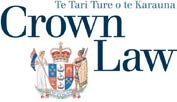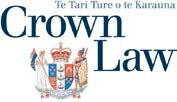link to page 1

CROWN LAW LITIGATION – DEFAMATION PROCEEDINGS
–
GUIDELINES
1.
From time to time Crown Law is asked to assist Ministers in relation to matters of defamation.
This usual y concerns threatened proceedings against Ministers or situations in which a Minister
wishes to address al egations considered to affect his or her personal reputation.
Government vs personal or political business
2.
An immediate question is whether the matter is truly one of government business rather than
personal or political business. If it does not arise out of the exercise of governmental functions
Crown Law should not become involved in giving detailed advice. Even where a matter is
linked to government business it wil often be the case that a private lawyer should be engaged
to represent the Minister.
3.
The reason for general y treating defamation as a private matter is because questions of whether
it is appropriate to resist complaints of persons who consider they have been aggrieved by
Ministerial action in relation to their reputations can affect the political and personal positions
of Ministers.
4.
From a Government perspective, the perceived best advice is often to apologise, but that may
not accord with a Minister’s political interests. Decisions on whether or not to apologise or to
contest legal proceedings have the potential to have great impact on political reputation. For
that reason, it has always been the Solicitor-General’s practice to look to seek experienced
defamation counsel to represent Ministers in such matters. When that is done, the Cabinet
Manual makes provision for circumstances in which the Government wil pay for the
representation and indemnify the Minister.
1
Indemnity for expenses / Representation / Costs
5.
If the Attorney-General forms the view that the matter arose from the Minister’s duties, the
Attorney-General wil consult the Prime Minister and the Minister of Finance, and submit a
paper to Cabinet seeking a decision on whether to indemnify the Minister’s expenses or leave
the Minister to manage the case as a private expense. Cabinet wil also decide the Vote and
appropriation from which the expenses would be met.
6.
It is not desirable for departments to be handling potential defamation matters on behalf of
Ministers. If Cabinet agrees to the retention of private counsel, the choice of counsel is a
matter for decision between the Minister after consultation with the Attorney-General who wil
have taken advice of the Solicitor-General. The Solicitor-General will then retain counsel and
settle the basis on which the fees wil be charged. The Minister is required to refer bills for legal
expenses to Crown Law for certification before they are paid.
7.
Where proceedings have been taken personally against a Minister, Cabinet will usually defer the
issue of an indemnity on costs or damages until after the trial, at which point Cabinet will
decide the issue on the advice of the Attorney-General or the Solicitor-General.
8.
The Attorney-General may decide to defer any decision as to whether a Minister should be
indemnified against costs or damages. If costs or damages awarded against the Minister for
defamation may be attributed to dishonest or malicious statements by the Minister, then
Cabinet may consider that the Minister’s words went beyond the bounds of duty, and it is not
therefore appropriate to indemnify the Minister. An award of costs and/or damages made
against the Minister wil otherwise be charged to the relevant Vote and appropriation.
1
Paragraphs 4.36 to 4.61 of the Cabinet Manual 2017.
DEFAMATION PROCEEDINGS- GUIDELINES
link to page 2 link to page 2

CROWN LAW LITIGATION – DEFAMATION PROCEEDINGS
–
GUIDELINES
9.
If the Crown meets the costs of the Minister’s defence, any costs or damages awarded in the
Minister’s favour are to be regarded as public funds, and paid into a Crown or departmental
bank account, unless Cabinet directs otherwise.
Defamation proceedings taken by Ministers
10.
The scheme of the Cabinet Manual in relation to Ministers as plaintiffs, is that if a Minister
desires to be a plaintiff in an action to clear his or her name, he or she must discuss the matter
first with the Prime Minister and the Attorney-General who will usually consult the Solicitor-
General. The Attorney-General wil then ask Cabinet to agree that the matter be investigated
by the Solicitor-General or by private counsel to determine whether it would be in the public
interest for the Minister to take a personal action in the courts at the Crown's expense to
resolve the matter. An opinion on the merits of the claim, prepared either by the Solicitor-
General or private counsel, wil be provided to the Attorney-General, together with the
Solicitor-General's views on the public interest aspect. On the basis of this advice, the
Attorney-General may seek Cabinet's authorisation for the Minister to pursue the claim at the
Crown's expense
.2
11.
If a Minister is successful as a plaintiff in proceedings that have been funded by the Crown, any
costs or damages awarded should be paid into a Crown or departmental bank account unless
Cabinet directs otherwise (for example, where the Crown has contributed only part of the
Minister's costs).
3
Public servants
12.
In relation to public servants, a Chief Executive or delegate confronted with such a situation
who wishes to support an employee in terms of the Chief Executive’s statutory duties, needs to
ensure the employee makes a choice early on as to whether an attempt to resolve the matter by
a departmental initiative should be taken or whether they may wish to sue. If the latter is the
case, the Chief Executive, before seeking an apology, should arrange for representation of the
individual at departmental expense. At various stages the department will need to consider
whether it is going to continue to support the employee as matters develop. Each case wil
need to be considered on its merits but a chief executive wil need to be mindful of the
requirement in s 73(1)(a) of the Public Service Act 2020 to operate a personnel policy that
complies with the principle of being a good employer.
13.
In this area, Crown Law can assist departments to deal with “grumbles”, by drafting or
checking letters in response. But if a matter looks as though it may not lead to an early
satisfactory apology, a Minister in particular should always be asked at a senior level whether or
not independent legal advice is desired.
14.
Paragraph 31 of th
e Cabinet Directions for the Conduct of Crown Legal Business 2016
provides that:
If an employee of a government department is made a defendant in a civil action arising out of
the course of his or her employment, the Crown shal bear the expenses of that defence, and the
Attorney-General may take over the conduct of the case. For the purposes of these Directions
“employee” includes a Chief Executive.
2
Paragraph 4.59 of the Cabinet Manual.
3
Paragraph 4.61 of the Cabinet Manual.
DEFAMATION PROCEEDINGS- GUIDELINES

CROWN LAW LITIGATION – DEFAMATION PROCEEDINGS
–
GUIDELINES
Crown Counsel
15.
In regard to defamation proceedings brought against Crown Counsel, counsel at Crown Law
have some experience but independent advice is likely given the complexities of the suit.
Guideline Owner – Convenor, Professional Standards Committee
Published on 17 November 2014. Updated March 2017 and September 2020
To be reviewed September 2023
DEFAMATION PROCEEDINGS- GUIDELINES
Document Outline


